Blog Assignment: Internal Environment of Tourism and Hospitality
VerifiedAdded on 2022/12/20
|7
|1521
|76
Homework Assignment
AI Summary
This assignment presents a blog analyzing the internal environment of modern tourism and hospitality management. It begins with a review of an academic article discussing the role of human resources in enhancing innovation within tourism enterprises, emphasizing the importance of internal management and high-quality service. The blog then explores leadership competencies for hospitality managers in the 21st century, highlighting the need for technological skills and customer-centric approaches. The assignment also reviews an academic article on tourism management perspectives, focusing on maintaining employee motivation and addressing the shortage of skilled professionals in the Vietnam tourism sector. The blog incorporates multiple articles and provides comments on each blog, highlighting the need for innovation, customer focus, and skilled professionals to ensure success in the dynamic tourism and hospitality industries.
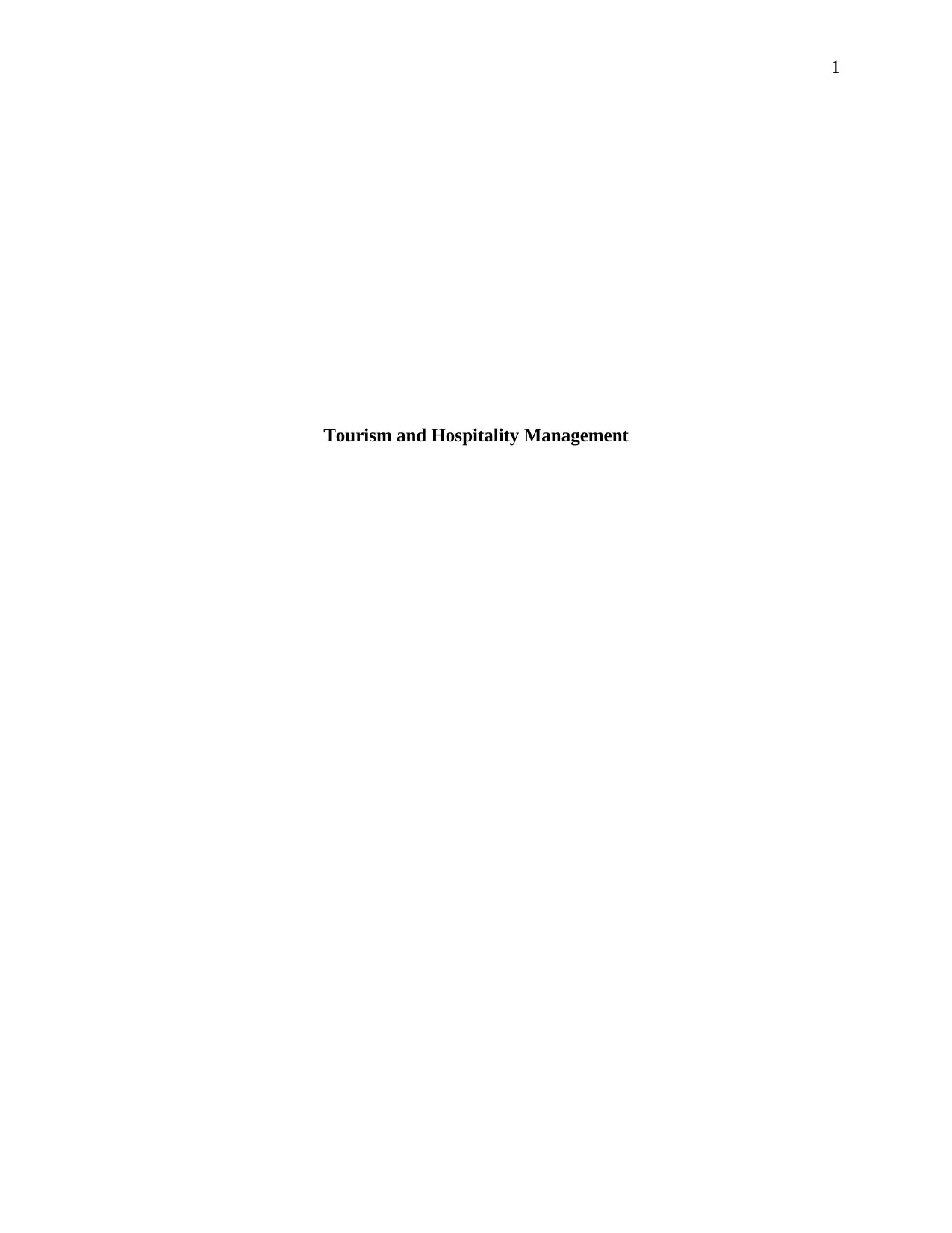
1
Tourism and Hospitality Management
Tourism and Hospitality Management
Paraphrase This Document
Need a fresh take? Get an instant paraphrase of this document with our AI Paraphraser
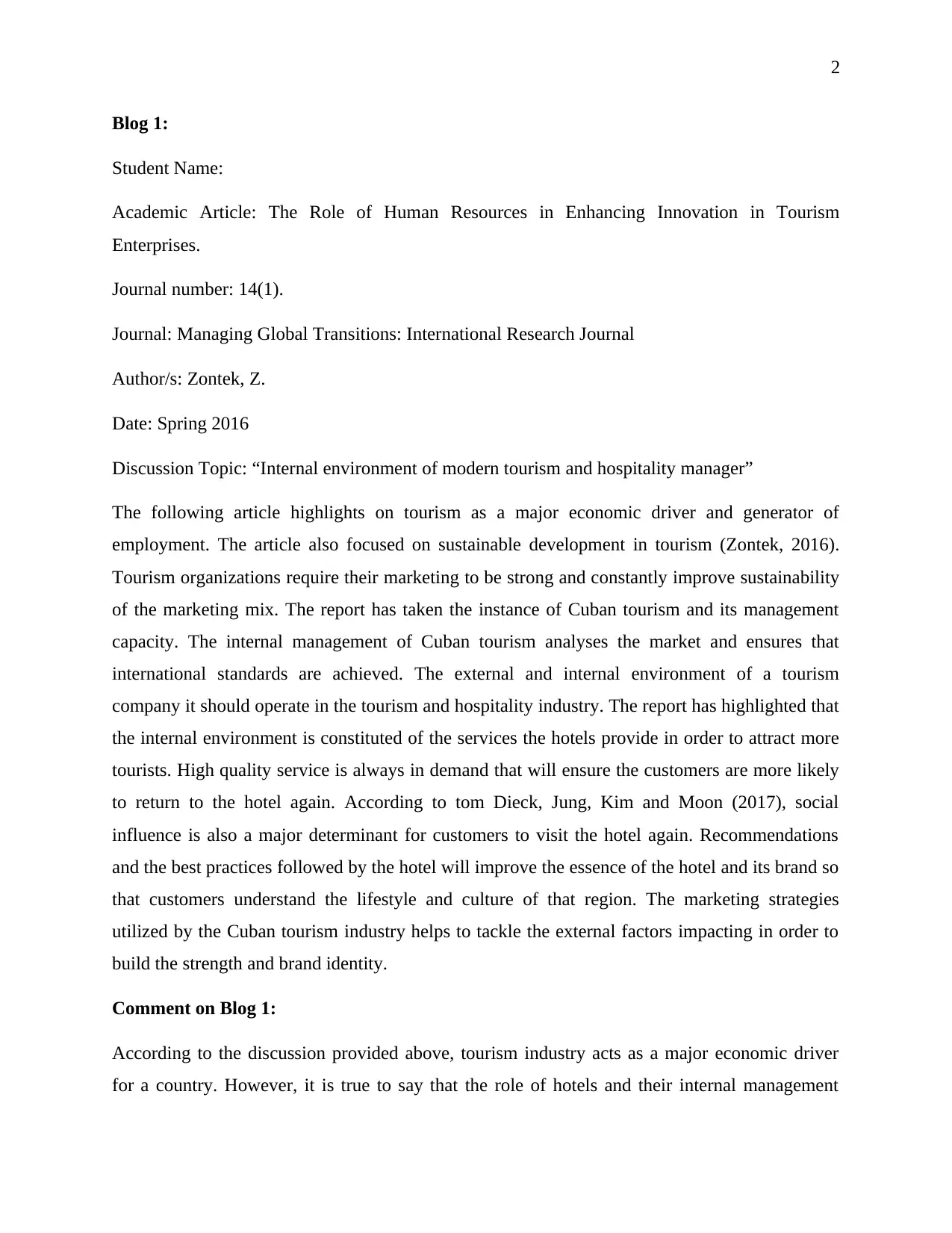
2
Blog 1:
Student Name:
Academic Article: The Role of Human Resources in Enhancing Innovation in Tourism
Enterprises.
Journal number: 14(1).
Journal: Managing Global Transitions: International Research Journal
Author/s: Zontek, Z.
Date: Spring 2016
Discussion Topic: “Internal environment of modern tourism and hospitality manager”
The following article highlights on tourism as a major economic driver and generator of
employment. The article also focused on sustainable development in tourism (Zontek, 2016).
Tourism organizations require their marketing to be strong and constantly improve sustainability
of the marketing mix. The report has taken the instance of Cuban tourism and its management
capacity. The internal management of Cuban tourism analyses the market and ensures that
international standards are achieved. The external and internal environment of a tourism
company it should operate in the tourism and hospitality industry. The report has highlighted that
the internal environment is constituted of the services the hotels provide in order to attract more
tourists. High quality service is always in demand that will ensure the customers are more likely
to return to the hotel again. According to tom Dieck, Jung, Kim and Moon (2017), social
influence is also a major determinant for customers to visit the hotel again. Recommendations
and the best practices followed by the hotel will improve the essence of the hotel and its brand so
that customers understand the lifestyle and culture of that region. The marketing strategies
utilized by the Cuban tourism industry helps to tackle the external factors impacting in order to
build the strength and brand identity.
Comment on Blog 1:
According to the discussion provided above, tourism industry acts as a major economic driver
for a country. However, it is true to say that the role of hotels and their internal management
Blog 1:
Student Name:
Academic Article: The Role of Human Resources in Enhancing Innovation in Tourism
Enterprises.
Journal number: 14(1).
Journal: Managing Global Transitions: International Research Journal
Author/s: Zontek, Z.
Date: Spring 2016
Discussion Topic: “Internal environment of modern tourism and hospitality manager”
The following article highlights on tourism as a major economic driver and generator of
employment. The article also focused on sustainable development in tourism (Zontek, 2016).
Tourism organizations require their marketing to be strong and constantly improve sustainability
of the marketing mix. The report has taken the instance of Cuban tourism and its management
capacity. The internal management of Cuban tourism analyses the market and ensures that
international standards are achieved. The external and internal environment of a tourism
company it should operate in the tourism and hospitality industry. The report has highlighted that
the internal environment is constituted of the services the hotels provide in order to attract more
tourists. High quality service is always in demand that will ensure the customers are more likely
to return to the hotel again. According to tom Dieck, Jung, Kim and Moon (2017), social
influence is also a major determinant for customers to visit the hotel again. Recommendations
and the best practices followed by the hotel will improve the essence of the hotel and its brand so
that customers understand the lifestyle and culture of that region. The marketing strategies
utilized by the Cuban tourism industry helps to tackle the external factors impacting in order to
build the strength and brand identity.
Comment on Blog 1:
According to the discussion provided above, tourism industry acts as a major economic driver
for a country. However, it is true to say that the role of hotels and their internal management
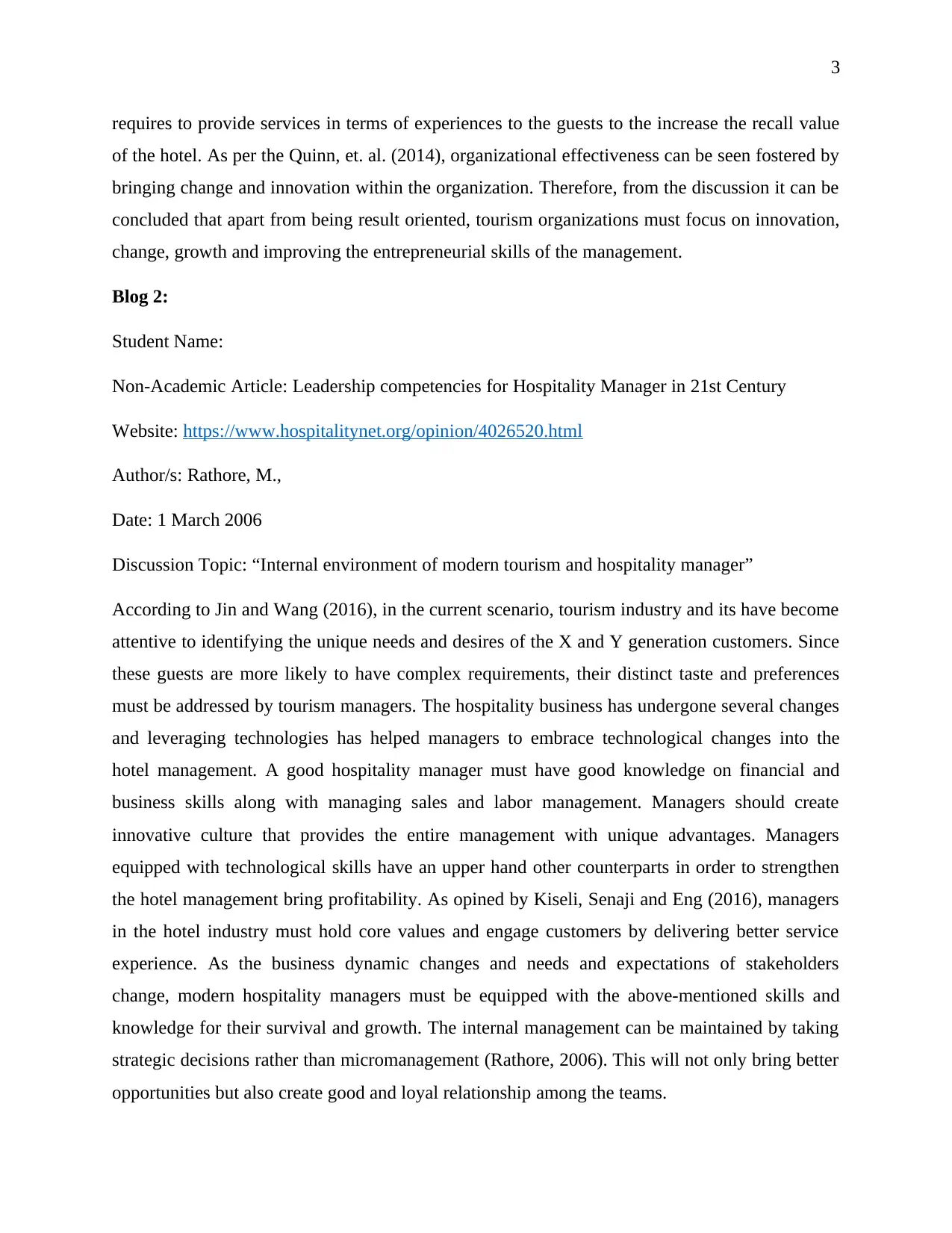
3
requires to provide services in terms of experiences to the guests to the increase the recall value
of the hotel. As per the Quinn, et. al. (2014), organizational effectiveness can be seen fostered by
bringing change and innovation within the organization. Therefore, from the discussion it can be
concluded that apart from being result oriented, tourism organizations must focus on innovation,
change, growth and improving the entrepreneurial skills of the management.
Blog 2:
Student Name:
Non-Academic Article: Leadership competencies for Hospitality Manager in 21st Century
Website: https://www.hospitalitynet.org/opinion/4026520.html
Author/s: Rathore, M.,
Date: 1 March 2006
Discussion Topic: “Internal environment of modern tourism and hospitality manager”
According to Jin and Wang (2016), in the current scenario, tourism industry and its have become
attentive to identifying the unique needs and desires of the X and Y generation customers. Since
these guests are more likely to have complex requirements, their distinct taste and preferences
must be addressed by tourism managers. The hospitality business has undergone several changes
and leveraging technologies has helped managers to embrace technological changes into the
hotel management. A good hospitality manager must have good knowledge on financial and
business skills along with managing sales and labor management. Managers should create
innovative culture that provides the entire management with unique advantages. Managers
equipped with technological skills have an upper hand other counterparts in order to strengthen
the hotel management bring profitability. As opined by Kiseli, Senaji and Eng (2016), managers
in the hotel industry must hold core values and engage customers by delivering better service
experience. As the business dynamic changes and needs and expectations of stakeholders
change, modern hospitality managers must be equipped with the above-mentioned skills and
knowledge for their survival and growth. The internal management can be maintained by taking
strategic decisions rather than micromanagement (Rathore, 2006). This will not only bring better
opportunities but also create good and loyal relationship among the teams.
requires to provide services in terms of experiences to the guests to the increase the recall value
of the hotel. As per the Quinn, et. al. (2014), organizational effectiveness can be seen fostered by
bringing change and innovation within the organization. Therefore, from the discussion it can be
concluded that apart from being result oriented, tourism organizations must focus on innovation,
change, growth and improving the entrepreneurial skills of the management.
Blog 2:
Student Name:
Non-Academic Article: Leadership competencies for Hospitality Manager in 21st Century
Website: https://www.hospitalitynet.org/opinion/4026520.html
Author/s: Rathore, M.,
Date: 1 March 2006
Discussion Topic: “Internal environment of modern tourism and hospitality manager”
According to Jin and Wang (2016), in the current scenario, tourism industry and its have become
attentive to identifying the unique needs and desires of the X and Y generation customers. Since
these guests are more likely to have complex requirements, their distinct taste and preferences
must be addressed by tourism managers. The hospitality business has undergone several changes
and leveraging technologies has helped managers to embrace technological changes into the
hotel management. A good hospitality manager must have good knowledge on financial and
business skills along with managing sales and labor management. Managers should create
innovative culture that provides the entire management with unique advantages. Managers
equipped with technological skills have an upper hand other counterparts in order to strengthen
the hotel management bring profitability. As opined by Kiseli, Senaji and Eng (2016), managers
in the hotel industry must hold core values and engage customers by delivering better service
experience. As the business dynamic changes and needs and expectations of stakeholders
change, modern hospitality managers must be equipped with the above-mentioned skills and
knowledge for their survival and growth. The internal management can be maintained by taking
strategic decisions rather than micromanagement (Rathore, 2006). This will not only bring better
opportunities but also create good and loyal relationship among the teams.
⊘ This is a preview!⊘
Do you want full access?
Subscribe today to unlock all pages.

Trusted by 1+ million students worldwide
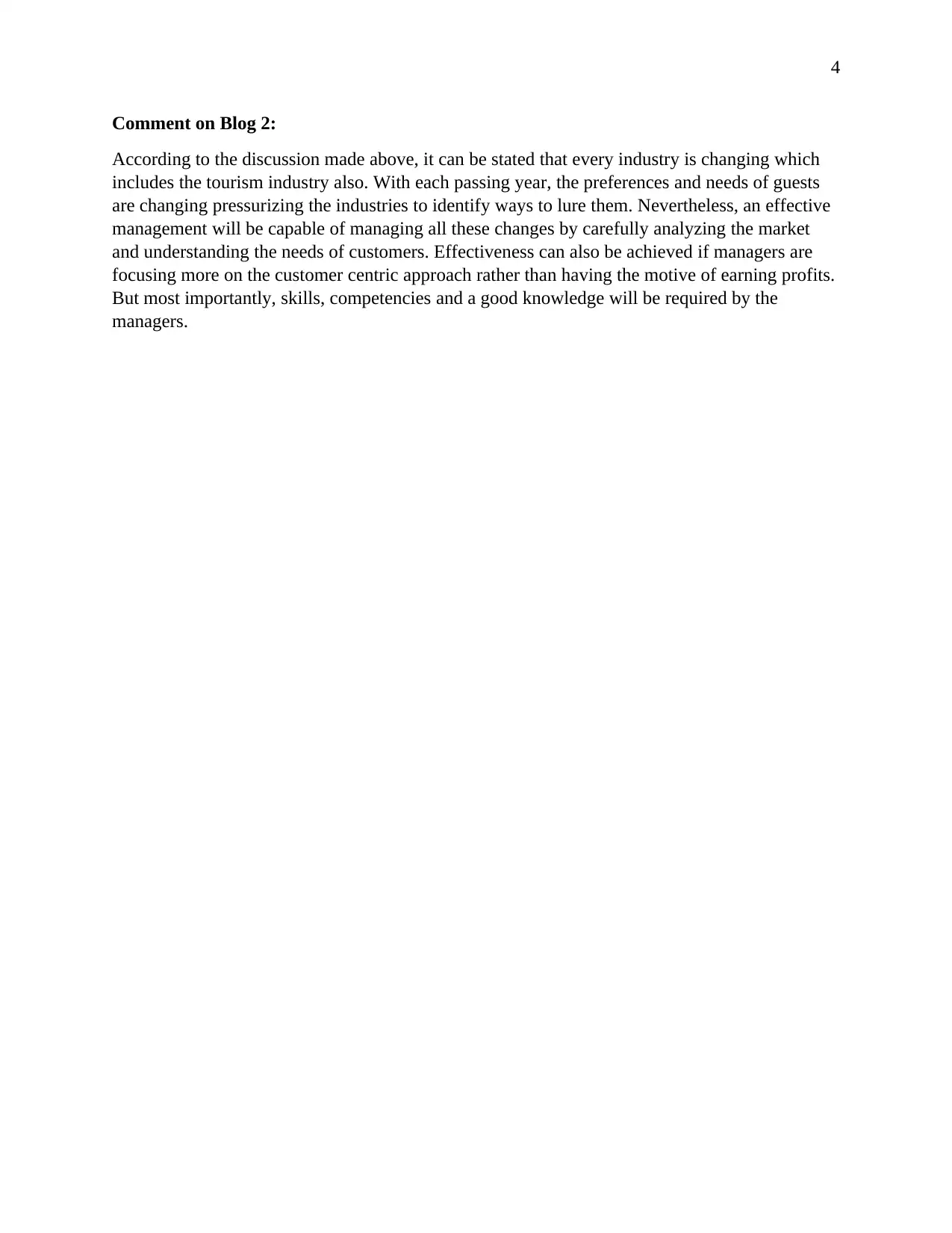
4
Comment on Blog 2:
According to the discussion made above, it can be stated that every industry is changing which
includes the tourism industry also. With each passing year, the preferences and needs of guests
are changing pressurizing the industries to identify ways to lure them. Nevertheless, an effective
management will be capable of managing all these changes by carefully analyzing the market
and understanding the needs of customers. Effectiveness can also be achieved if managers are
focusing more on the customer centric approach rather than having the motive of earning profits.
But most importantly, skills, competencies and a good knowledge will be required by the
managers.
Comment on Blog 2:
According to the discussion made above, it can be stated that every industry is changing which
includes the tourism industry also. With each passing year, the preferences and needs of guests
are changing pressurizing the industries to identify ways to lure them. Nevertheless, an effective
management will be capable of managing all these changes by carefully analyzing the market
and understanding the needs of customers. Effectiveness can also be achieved if managers are
focusing more on the customer centric approach rather than having the motive of earning profits.
But most importantly, skills, competencies and a good knowledge will be required by the
managers.
Paraphrase This Document
Need a fresh take? Get an instant paraphrase of this document with our AI Paraphraser
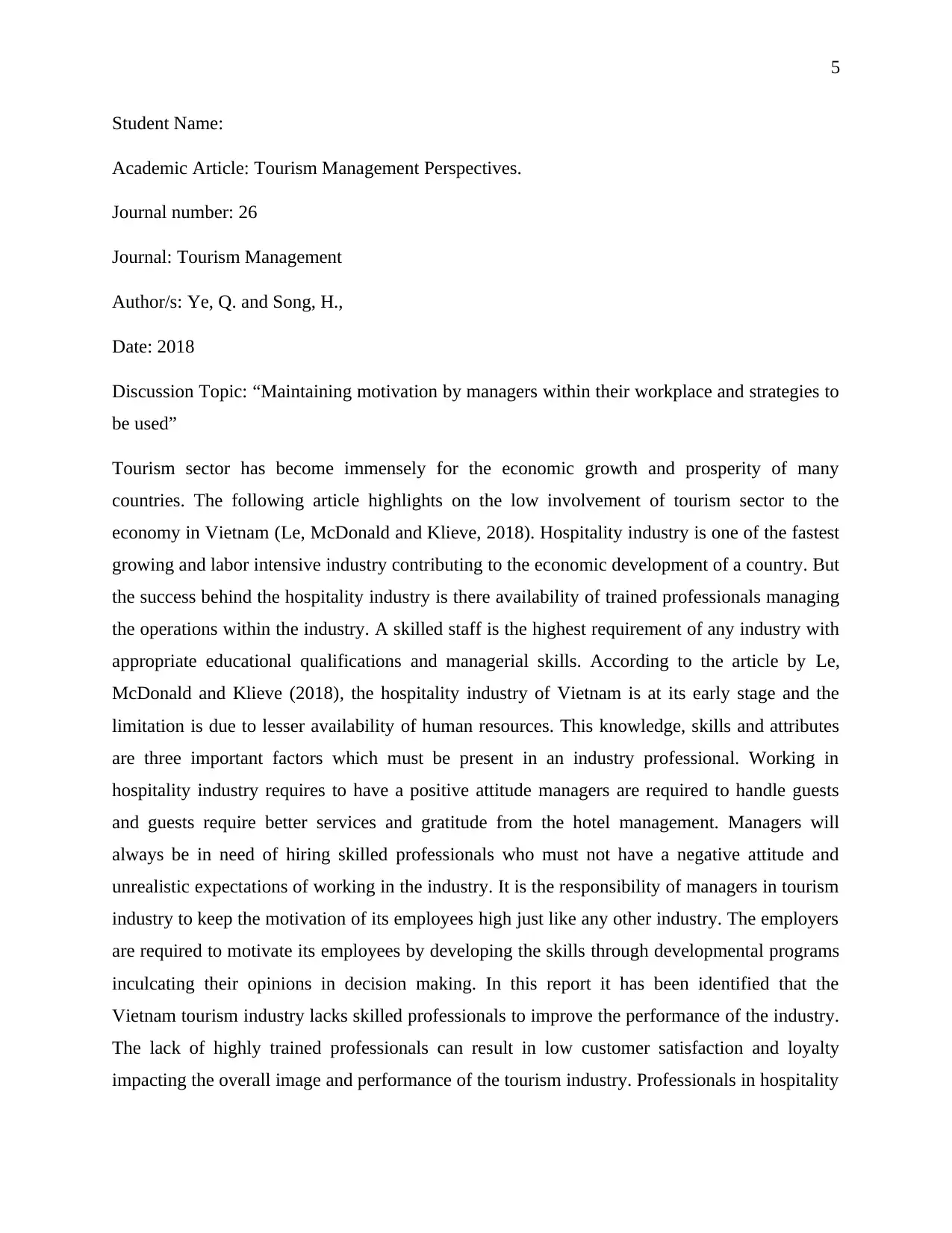
5
Student Name:
Academic Article: Tourism Management Perspectives.
Journal number: 26
Journal: Tourism Management
Author/s: Ye, Q. and Song, H.,
Date: 2018
Discussion Topic: “Maintaining motivation by managers within their workplace and strategies to
be used”
Tourism sector has become immensely for the economic growth and prosperity of many
countries. The following article highlights on the low involvement of tourism sector to the
economy in Vietnam (Le, McDonald and Klieve, 2018). Hospitality industry is one of the fastest
growing and labor intensive industry contributing to the economic development of a country. But
the success behind the hospitality industry is there availability of trained professionals managing
the operations within the industry. A skilled staff is the highest requirement of any industry with
appropriate educational qualifications and managerial skills. According to the article by Le,
McDonald and Klieve (2018), the hospitality industry of Vietnam is at its early stage and the
limitation is due to lesser availability of human resources. This knowledge, skills and attributes
are three important factors which must be present in an industry professional. Working in
hospitality industry requires to have a positive attitude managers are required to handle guests
and guests require better services and gratitude from the hotel management. Managers will
always be in need of hiring skilled professionals who must not have a negative attitude and
unrealistic expectations of working in the industry. It is the responsibility of managers in tourism
industry to keep the motivation of its employees high just like any other industry. The employers
are required to motivate its employees by developing the skills through developmental programs
inculcating their opinions in decision making. In this report it has been identified that the
Vietnam tourism industry lacks skilled professionals to improve the performance of the industry.
The lack of highly trained professionals can result in low customer satisfaction and loyalty
impacting the overall image and performance of the tourism industry. Professionals in hospitality
Student Name:
Academic Article: Tourism Management Perspectives.
Journal number: 26
Journal: Tourism Management
Author/s: Ye, Q. and Song, H.,
Date: 2018
Discussion Topic: “Maintaining motivation by managers within their workplace and strategies to
be used”
Tourism sector has become immensely for the economic growth and prosperity of many
countries. The following article highlights on the low involvement of tourism sector to the
economy in Vietnam (Le, McDonald and Klieve, 2018). Hospitality industry is one of the fastest
growing and labor intensive industry contributing to the economic development of a country. But
the success behind the hospitality industry is there availability of trained professionals managing
the operations within the industry. A skilled staff is the highest requirement of any industry with
appropriate educational qualifications and managerial skills. According to the article by Le,
McDonald and Klieve (2018), the hospitality industry of Vietnam is at its early stage and the
limitation is due to lesser availability of human resources. This knowledge, skills and attributes
are three important factors which must be present in an industry professional. Working in
hospitality industry requires to have a positive attitude managers are required to handle guests
and guests require better services and gratitude from the hotel management. Managers will
always be in need of hiring skilled professionals who must not have a negative attitude and
unrealistic expectations of working in the industry. It is the responsibility of managers in tourism
industry to keep the motivation of its employees high just like any other industry. The employers
are required to motivate its employees by developing the skills through developmental programs
inculcating their opinions in decision making. In this report it has been identified that the
Vietnam tourism industry lacks skilled professionals to improve the performance of the industry.
The lack of highly trained professionals can result in low customer satisfaction and loyalty
impacting the overall image and performance of the tourism industry. Professionals in hospitality
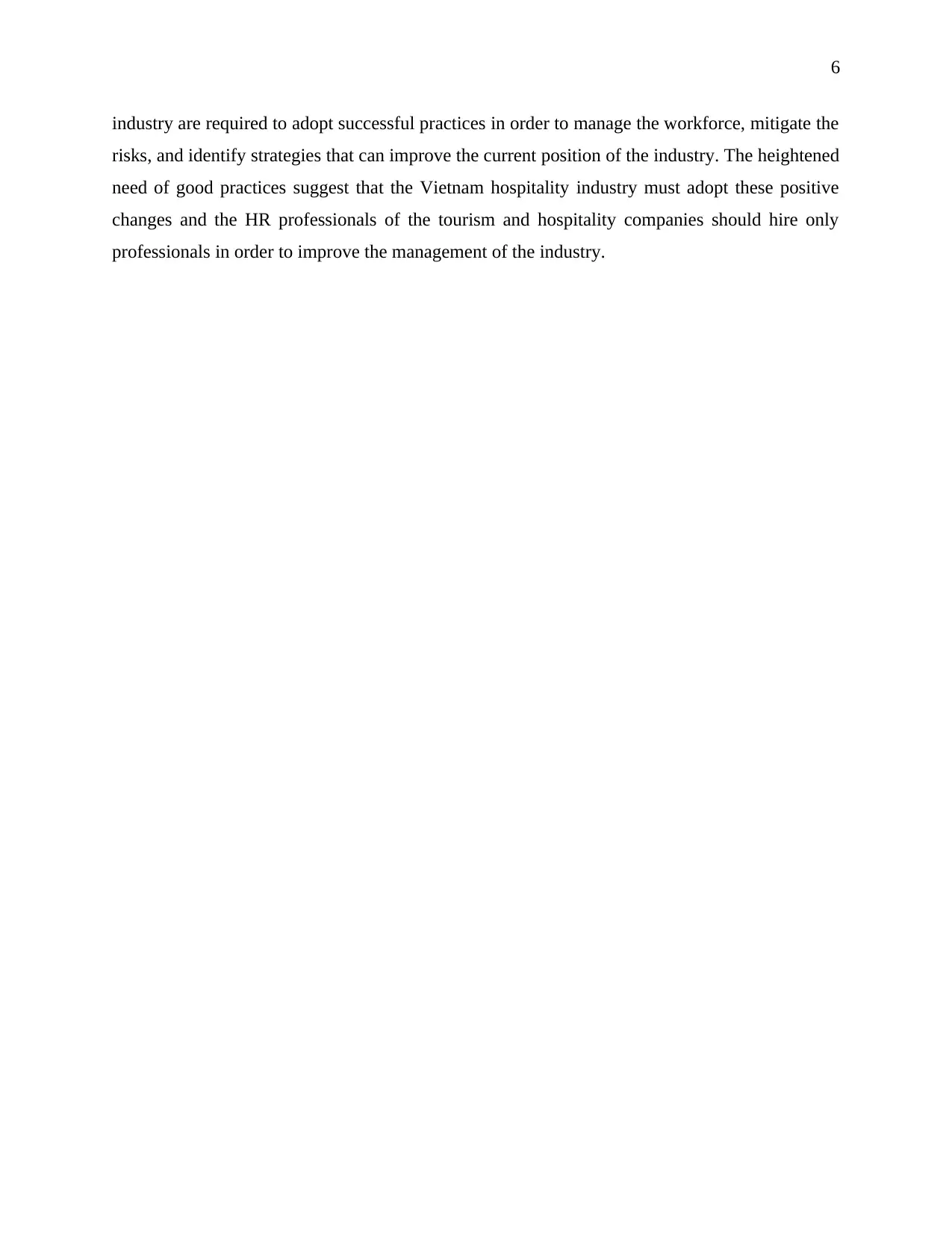
6
industry are required to adopt successful practices in order to manage the workforce, mitigate the
risks, and identify strategies that can improve the current position of the industry. The heightened
need of good practices suggest that the Vietnam hospitality industry must adopt these positive
changes and the HR professionals of the tourism and hospitality companies should hire only
professionals in order to improve the management of the industry.
industry are required to adopt successful practices in order to manage the workforce, mitigate the
risks, and identify strategies that can improve the current position of the industry. The heightened
need of good practices suggest that the Vietnam hospitality industry must adopt these positive
changes and the HR professionals of the tourism and hospitality companies should hire only
professionals in order to improve the management of the industry.
⊘ This is a preview!⊘
Do you want full access?
Subscribe today to unlock all pages.

Trusted by 1+ million students worldwide
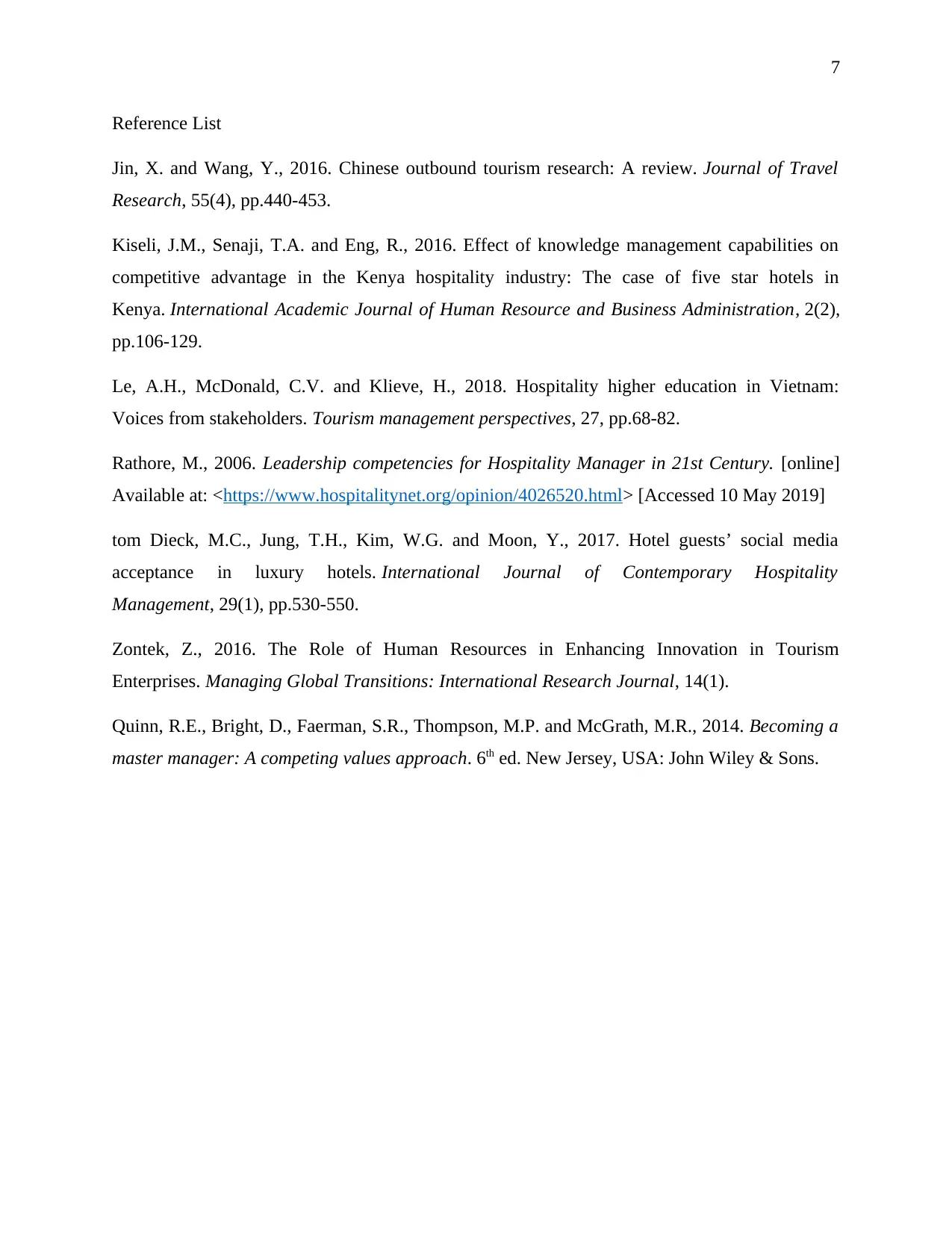
7
Reference List
Jin, X. and Wang, Y., 2016. Chinese outbound tourism research: A review. Journal of Travel
Research, 55(4), pp.440-453.
Kiseli, J.M., Senaji, T.A. and Eng, R., 2016. Effect of knowledge management capabilities on
competitive advantage in the Kenya hospitality industry: The case of five star hotels in
Kenya. International Academic Journal of Human Resource and Business Administration, 2(2),
pp.106-129.
Le, A.H., McDonald, C.V. and Klieve, H., 2018. Hospitality higher education in Vietnam:
Voices from stakeholders. Tourism management perspectives, 27, pp.68-82.
Rathore, M., 2006. Leadership competencies for Hospitality Manager in 21st Century. [online]
Available at: <https://www.hospitalitynet.org/opinion/4026520.html> [Accessed 10 May 2019]
tom Dieck, M.C., Jung, T.H., Kim, W.G. and Moon, Y., 2017. Hotel guests’ social media
acceptance in luxury hotels. International Journal of Contemporary Hospitality
Management, 29(1), pp.530-550.
Zontek, Z., 2016. The Role of Human Resources in Enhancing Innovation in Tourism
Enterprises. Managing Global Transitions: International Research Journal, 14(1).
Quinn, R.E., Bright, D., Faerman, S.R., Thompson, M.P. and McGrath, M.R., 2014. Becoming a
master manager: A competing values approach. 6th ed. New Jersey, USA: John Wiley & Sons.
Reference List
Jin, X. and Wang, Y., 2016. Chinese outbound tourism research: A review. Journal of Travel
Research, 55(4), pp.440-453.
Kiseli, J.M., Senaji, T.A. and Eng, R., 2016. Effect of knowledge management capabilities on
competitive advantage in the Kenya hospitality industry: The case of five star hotels in
Kenya. International Academic Journal of Human Resource and Business Administration, 2(2),
pp.106-129.
Le, A.H., McDonald, C.V. and Klieve, H., 2018. Hospitality higher education in Vietnam:
Voices from stakeholders. Tourism management perspectives, 27, pp.68-82.
Rathore, M., 2006. Leadership competencies for Hospitality Manager in 21st Century. [online]
Available at: <https://www.hospitalitynet.org/opinion/4026520.html> [Accessed 10 May 2019]
tom Dieck, M.C., Jung, T.H., Kim, W.G. and Moon, Y., 2017. Hotel guests’ social media
acceptance in luxury hotels. International Journal of Contemporary Hospitality
Management, 29(1), pp.530-550.
Zontek, Z., 2016. The Role of Human Resources in Enhancing Innovation in Tourism
Enterprises. Managing Global Transitions: International Research Journal, 14(1).
Quinn, R.E., Bright, D., Faerman, S.R., Thompson, M.P. and McGrath, M.R., 2014. Becoming a
master manager: A competing values approach. 6th ed. New Jersey, USA: John Wiley & Sons.
1 out of 7
Related Documents
Your All-in-One AI-Powered Toolkit for Academic Success.
+13062052269
info@desklib.com
Available 24*7 on WhatsApp / Email
![[object Object]](/_next/static/media/star-bottom.7253800d.svg)
Unlock your academic potential
Copyright © 2020–2026 A2Z Services. All Rights Reserved. Developed and managed by ZUCOL.





